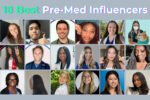An Overview of the University of Colorado School of Medicine:
The University Of Colorado School of Medicine is a phenomenal institution to train for professional health-science careers. The campus is state-of-the-art; it features a comprehensive University teaching hospital, Colorado Children’s hospital which is ranked in the Top 5 nationally, robust research facilities, and many student learning spaces, lecture halls, study rooms, the campus library, and social activities. CU is known for blending a rigorous training curriculum with a focus on life outside of school too. Many students find themselves enjoying the Rocky Mountains for skiing and hiking or exploring Denver. You will get excellent training and also enjoy your environment as a student at CU.
Hear From More Medical School Deans
What does it take to get into the University of Colorado School of Medicine?
We recently Dr. SooHoo, a practicing ophthalmologist, Associate Dean of Admissions, and Program Director in Ophthalmology at the University of Colorado to discuss what it takes to get into U of C (hint, a great GPA and MCAT are just a start!) and to talk about the medical school admissions process and medical school applications.
About Dr. SooHoo:
Dr. SoooHoo has held different roles in involvement in medical education. He has worked in the GME (graduate medical education) space and served as the residency Program Director for Ophthalmology at the University of Colorado School of Medicine. He is also a physician advisor for medical students at the School of Medicine.
Video Transcript:
My involvement with admissions actually started when I was a medical student where I went to medical school. I was a student member of the admissions committee, and I really liked the process of talking to candidates and learning about them and why they were passionate about medicine. And so when I joined the faculty at the University of Colorado, I asked if they needed volunteers to do interviews. And I think I volunteered a lot. And so they said, oh, why don’t you volunteer for this other committee and this other committee?
And it sort of snowballs and eventually led to this role. So it’s been a great journey. I think my advice or sometimes people say, how did you end up in this position? And really the things that I’ve done has been to say yes to things that interest me and do things that I like to do and not necessarily with any specific end goal in mind. When I volunteered to do interviews for medical students, this was not my anticipated result.
How Can a Medical School Applicant Stand Out?
That’s a difficult one because I think applicants can stand out in a variety of ways. I’ve often talked about applicants that are really well balanced, where they’ve sort of checked the boxes that you historically hear about, where they have a strong academic record. They’ve done well in standardized tests, and they’ve performed well in community service activities or leadership activities, research, whatever it might be. But they’ve done those things in a way that’s authentic and longitudinal. And then I see candidates as well that are what I call, well, unbalanced, where they’re really strong in one particular subdomain of those things, and that because they put so much time into one thing, is potentially limited how much time they’ve been able to do other things.
So we try and contextualize people’s experiences. I think what stands out for me the most about applicants is when those experiences are varied and when they inform the candidates’ decisions in a sort of nuanced and reflective way. So I often talk about an experience can be the same thing on paper, but the way a candidate talks about it can really be different. And so I’m looking for that reflection piece because I might see a candidate who was the captain of the soccer team, let’s say, and that’s a great leadership experience. But then I asked them, well, tell me what you learned from that, or how did that change who you are as a leader?
And I can get very different responses, right? I can get someone who’s like, that was cool. We won the state championship and it was fun. And I can get someone who says, when I led my first practice, I realized that what different groups of players wanted wasn’t necessarily the same. And so what I did was I sent out an anonymous survey to get feedback, and then we tried a bunch of different things.
And it was an iterative process I learned that leadership isn’t just about having a vision for how things should be, but it’s also about being able to incorporate other people’s visions into the experience. And again, on paper, those are the same experience, but one of them has a reflective and growth mindset component and one of them doesn’t.
How has medical school admissions changed?
Yes, I think I’ve had sort of different views of it, of course, as just an interviewer and then sort of now being sort of more behind the scenes and seeing the big picture of the whole process. I think the applicants on the whole have more resources, even such as yours, and they have more knowledge, and there’s student doctor net and there’s Reddit, and there are things that didn’t exist when I was applying to medical school. And many of those things can be helpful, right, about logistics of when to apply or where to apply or how to get things done. But there can also be a lot of noise in those platforms. And so trying to separate the truth from the non-truths can be difficult.
And the applicants are just much more sophisticated. They’re thinking three steps ahead of where I was when I was applying to medical school. I just wanted to get into medical school and be a doctor. I had never heard of step one or step two. My current specialty, ophthalmology, I’d actually never heard of before I went to medical school.
I didn’t know it was a medical specialty. And so I think the applicants nowadays just have a lot more exposure and have thought more carefully about the field of medicine, mostly in positive ways, sometimes in ways that are a little bit detrimental if they get too in the weeds for certain details. At the end of the day, I think most medical schools are more alike than they are different. And so I think sometimes kind of that gets bogged down in some of the details.
What makes the University of Colorado School of Medicine special?
So of course I’ll give a biased answer. I love our medical school. I wouldn’t work at our medical school, and I wouldn’t hold the role I do at our medical school if I didn’t believe in our people and our mission in the way that we train future physicians. I will say something that definitely makes us stand out is our curriculum. We just underwent a pretty significant curriculum reform that was several years in the making, and we’re one of the only, if not the only school in the country that has moved to an all-LIC or longitudinal integrated clerkship model for the clinical training year.
So we no longer have any traditional block clerkships. It’s all a longitudinal process, and that’s been shown to be better for education in a variety of ways and has been shown to increase empathy for students during school and decreased burnout.
I usually tell students a few things. One is to get lots of advice because if you are just talking to the free medical office at your undergraduate institution, or you’re just talking to your friend’s parent who went to medical school 30 years ago, or whatever it might be, or they’re just talking to you or me, they’re going to get one idea about what medicine is or how to navigate the process. So talk to a lot of different people at different stages of the process, someone that got into medical school last year and someone that finished medical school 30 years ago, and everything in between, as much as you can. And the nice thing is, because of those platforms I mentioned earlier, even if you don’t personally know anyone that’s a physician, and I didn’t when I was growing up, you can still tap into some networks that way. I see current medical students commenting on Reddit or Student Doctor Net all the time, and they’re more than happy to say, this was my experience applying.
What do you wish you had done differently in medical school admissions?
This is what I wish I had done differently, those kinds of things. So taking those things in and listening, but recognizing that not everybody’s experience is going to be the same as yours. The other thing that I think is really hard for students to understand is just the scale of the applicant pool and how good it is. I think it’s very tempting as a student to say, I’ve done all the right things, right? I’ve done well in the MCAT, I have a good GPA, I was president of this club, and I did this research project.
I should get into medical school. And yes, statistically you should, and yet you may not, because the numbers, at least at any individual school, are never in your favor. There’s no medical school where most of the applicants get in, and so you have to apply appropriately and apply broadly, and then you have to be sort of critical about where might your deficiencies be in your own application. And it’s hard, it’s very personal when it’s your life and your activities that you put down on paper. But the reality is there are more applicants than there are spots for medical school.
So it’s a really competitive process, and I think, depending on where you’re coming from if you’ve been an all-star and a superstar at your particular little part of the world when it’s scaled out into the larger realm of applications for medical school, you might just be another applicant out there.
Like I said, I think the curriculum in our medical school is unique. I’m biased because I trained here and I work here, and I know how invested the people are in the success of medical students and training future physician leaders.
I think what I would say, I’m lucky in my role. I get a seat at the table for pretty much all sorts of major committees at the medical school. And I think what I would tell you if you could see behind the curtain, is just how much people care. I think it feels like a really impersonal process, both on the admission side and even as a student sometimes, right? Why do we have to do this assignment?
Or why do we have to do XYZ? This is a waste of my time. Everything that we’re doing in all of our sort of thought processes and then all of our evaluation and changes that happen, it’s all framed around what’s best for the students and their education. And I have never seen a group of people come together with a common purpose like we do within the medical education department at our medical school. And the central focus is always, on how we educate people to be better doctors for the population.
What is the acceptance rate, average MCAT, and GPA at the University of Colorado School of Medicine?
The median GPA for accepted students was 3.82 and MCAT 515. It’s a highly selective school, with an MSC Competitiveness score of 71. Learn more about the school with the Med School Explorer.
What is the interview format at the University of Colorado?
Structured interviews with group and individual interviews are conducted for admissions. All applicants applying to the University of Colorado School of Medicine are also required to complete an online suite of assessments (Altus Suite), to assist with the selection process for the 2022-2023 Application Cycle.
What degree programs are offered at the University of Colorado School of Medicine?
The University of Colorado School of Medicine offers a variety of degree programs, including MD, PhD, and MD/PhD programs. The school also offers joint degree programs with other schools within the university, such as the JD/MD program with the University of Colorado Law School. In addition to its traditional degree programs, the school also offers a number of online and distance learning programs, but medical school is never fully virtual (hint, you have to see patients to be an effective physician!).
What are the secondary prompts at the University of Colorado School of Medicine for the 2022/23 admissions cycle?
MD Program, (All applicants write this one)
The pillars of our curriculum are Leadership, Curiosity, and Commitment. Tell us about how you have embodied one or more of these attributes in your path to medicine thus far. In which of these areas do you see the most opportunity for personal growth and why? Limit this response to 1000 words.Fort Collins program:*Please note: MSTP applicants CAN NOT apply to these programs. Please tell us why you are interested in being a part of the 4-year CUSTOM at CSU (Fort Collins Branch campus). With the background that FCB’s smaller class sizes and unique structure lead to a highly interactive curriculum, please tell us how this campus matches your learning style and personal philosophy. Limit your statement to 1500 characters, including spaces (approximately 300 words).
For Applicants to the rural program:
*Please note: MSTP applicants CAN NOT apply to these programs.
Describe your personal and professional goals in becoming a rural physician. In particular, describe your interest and ability to spend your clinical year in a rural community. You may also include how past experiences living and/or working in a rural area and your ties to or interest in rural Colorado communities align with your goals. Limit your statement to 1500 characters, including spaces (approximately 300 words)
We also sat down with Austin Jolly, a MedSchoolCoach USMLE tutor, to get more insights about the University of Colorado:
What are the admissions criteria for the School of Medicine? CU admits 184 students each year to the School of Medicine. Over 10,000 primary applications are submitted and over 700 interviews are offered for each admission cycle. Many admitted students are natives of Colorado, but CU is increasingly recruiting prospective students from across the country. CU is considered a competitive academic institution. CU also features a Medical Scientist Training Program (MSTP), which is the MD/Ph.D. curriculum where students spend 8-9 years obtaining both their MD and Ph.D. degrees.
What is Campus Life at the University of Colorado like?: The main campus is located in Aurora, Colorado, about twenty minutes from downtown Denver. The main campus houses the 3 major pillars of the institution: education buildings (lecture halls and study space), research facilities, and 3 hospitals which include the University Hospital, the Children’s Hospital, and the VA Hospital. The layout of the campus speaks to the interdisciplinary culture at CU. It is not uncommon for clinicians to take patient specimens from the hospital, walk 5 minutes across campus to the research buildings and perform translational, patient-centered research.
What is Denver like?: Denver sees over 300 days of sunshine each year. There are tons to do such as see the Colorado Rockies or Denver Broncos, visit museums, explore the Craft Brewery scene, biking trails, and dog parks, and witness gorgeous sunsets. Aurora is a multicultural city with great cuisines such as Ethiopian, Asian, and Latin American flavors.
What are the faculty at the University of Colorado School of Medicine like?: CU is a strong academic institution. Many of the faculty tend to be heavy researchers, making them leaders in their field. CU features many physician-scientists that help translate research into clinical practice. It is extremely easy for students at CU to get involved with research in the basic science or clinical investigation spaces.
What is the hospital system at the medical school? A key advantage of CU is the clinical opportunities available for medical students. University Hospital is the main tertiary care center in the region. Patients come from as far north as Montana and as far south as New Mexico to be cared for. Additionally, medical students rotate at Denver Health, which is our county hospital. Medical students will observe trauma cases and patients who are acutely ill at Denver Health. Finally, students who are interested in rural medicine can rotate at our sister campuses in Colorado Springs or Fort Collins.
What specialties are most popular at the University of Colorado Medical School? Several very strong specialties include internal medicine (their residency program is highly regarded), transplant surgery (the first liver transplant was conducted at CU), and pediatrics (Top 5 in the Country). From a research perspective, CU features NIH-funded faculty in the areas of Immunology, Neuroscience, Cardiovascular Biology, and Medical Engineering.
Are there negatives about the University of Colorado Medical School?: The curriculum has recently transitioned from a traditional block-based system to the Longitudinal Integrated Curriculum (LIC). While in the long run, the LIC model will be optimal for medical students to complete their clerkships with continuity in mentorship, the current transition phase does not come without some hiccups along the way. This “negative” is very temporary; the new curriculum with be more established in the coming years.
Fun Fact: The original medical school was established at CU Boulder in 1883.







